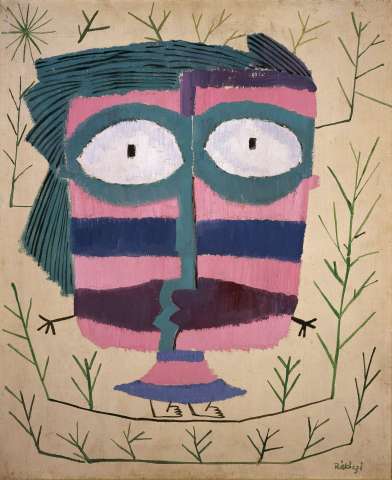The White Stag Group
dal 5/7/2005 al 2/10/2005
Segnalato da
5/7/2005
The White Stag Group
Irish Museum of Modern Art - IMMA, Dublin
A number of Irish and international artists active in Ireland in the late 1930s and 1940s. The exhibition comprises some 80 works and reflects the youthful dynamism and energy which artists such as Basil Rakoczi, Kenneth Hall, Paul Egestorff and others brought to the Irish art scene, when they settled here, mainly as conscientious objectors, at the outbreak of World War II. Works by artists who became associated with the group, including Patrick Scott and Bobby Dawson, are also being shown.

An exhibition of works by members of the White Stag Group, a number of Irish and
international artists active in Ireland in the late 1930s and 1940s, opens to the
public at the Irish Museum of Modern Art on Wednesday 6 July 2005. The exhibition,
entitled The White Stag Group, comprises some 80 works and reflects the youthful
dynamism and energy which artists such as Basil Rakoczi, Kenneth Hall, Paul
Egestorff and others brought to the Irish art scene, when they settled here, mainly
as conscientious objectors, at the outbreak of World War II. Works by Irish artists
who became associated with the group, including Patrick Scott and Bobby Dawson, are
also being shown.
The White Stag Group grew up mainly around Rakoczi and Hall. Rakoczi was born in
London in 1908 of mixed Irish and Hungarian parentage. He trained as an artist in
Britain and France before founding the group with Hall, a self-taught English
artist, in 1935. They moved to Ireland in 1939 attracted, like a number of other
pacifists and refugees, by Ireland's neutral status in relation to the War. The
group held its first exhibition in Dublin in April 1940, followed by a second show
in October of the same year, which was opened by Mainie Jellett. In her view the
group was the prime focus for Modernism in Ireland and the aim of those involved was
"to interpret the times in which we live", without being linked to any particular
school or "cramped by academic conventionality". Many other exhibitions followed.
Rakoczi and Hall rapidly became leaders of a notable, even notorious avant-garde
movement, which attracted many other painters and writers to their "subjective"
approach to art. Several artists who had belonged to other groupings, such as the
Society of Dublin Painters, became followers of the White Stag Group. Events and
meetings became a regular part of their activities, harking back to their
associations with the Bloomsbury set in London. The group took its name from the
family shield of a patron of the group, Herbrand Ingouville-Williams.
The vigour and vitality with which the group influenced the Irish arts scene in the
War years is clearly evident in the works in the exhibition. Hall's Pink Bird,
1943-45, and Many Birds, 1943-44, are part-Surrealist and part-Symbolist in
derivation, the latter showing the final phase of his subjective style, in which he
simplified the appearance of the creatures he painted to a near symbol of their
species, while at the same time emphasizing their natural attributes and habitat.
Rakoczi's Surrealist-inspired images Child Flying and Three, both 1943, are typical
of his work at this time and illustrate his playful psychological fantasies. In
most of Scott's works of this time colour is secondary in importance to the
aesthetic aspects of the linear division of the picture plane. The severely linear
treatment of Renvyle, 1943, as well as the slightly more colourful Evening
Landscape, 1944, illustrate these concerns, which where to remain characteristic of
much of his work. Egestorff, who had studied under Mainie Jellett, emphasized the
structural element of his compositions in Fusion, 1948, he concerns himself with
tone and prismatic colour progression in order to enable the eye to move freely
around the composition.
The group's multi-disciplinary ethos embraced many artistic forms, including
philosophy, music and literature and some examples of their work in these artforms
can also be seen in the exhibition. New recordings of the work of the composer
Brain Boydell will be available at a listening post in the exhibition space and on a
CD that accompanies the catalogue. Also included are novels by Ralph Cusack,
illustrated poems by Nick Nicholls and the poetry of Thurloe Conolly.
The exhibition is co-curated by Dr S B Kennedy, former Keeper of Art at the Ulster
Museum, Belfast, and Bruce Arnold, critic and art historian.
Concert
A concert featuring the music of Brian Boydell, organised jointly by IMMA and the
Contemporary Music Centre to coincide with the show, will be held at IMMA at 3.00pm
on Sunday 17 July 2005. The concert is made possible by the funding support of
Trinity College, Dublin, Varming Mulcahy Reilly Consulting Engineers and Mr Aleck
Crichton.
Talk
Dr S B Kennedy will give a gallery talk on the White Stag Group and their influence
on Irish painting in the New Galleries at IMMA at 11.00am on Wednesday 6 July 2005.
Admission is free, but booking is essential on Tel: +353 1 612 9900 or on the
automatic booking line +353 1 612 9948: Email: simona.lecce@imma.ie
A significant, fully-illustrated catalogue, written by Dr S B Kennedy with an essay
by Bruce Arnold and a CD on the work of the composer Brian Boydell, accompanies the
exhibition. Published by the Museum, it serves as an important record of the group's
activities, as no such publication previously existed. The catalogue is supported by
Mason Hayes & Curran Solicitors. (Price EUR32.00).
Admission is free.
Image: Basil Rakoczi, Lost in a Forrest, 1945, Oil on canvas, 61 x 50.8 cm, Private collection
Opening hours: Tuesday to Saturday 10.00am-5.30pm, except Wednesdays 10.30am-5.30pm. Sundays and Bank Holidays 12 noon- 5.30pm. Mondays Closed
Irish Museum of Modern Art
Royal Hospital Military Road Kilmainham 8
Dublin



